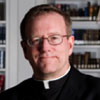Over on the Dedicated-Catholic page of Patheos’ symposium on the Future of Seminary Education, two more entries, and I think they’re both exceptional expositions of both the challenges facing our new generation of priests, and the profound gift of opportunity that lies within those very challenges.

Read Deacon Greg Kandra’s remarkable and moving story (it made me cry) of Father Martino BaThong Nguyen, who was born in great deprivation in Vietnam and now serves in the Diocese of Savannah in Georgia — because he wanted to be a missionary.
With his father still in prison, young Martino and his mother were sent to a Catholic refugee camp near the Cambodian border. They could pray in private. But to attend Mass, they had to walk miles, often stopping overnight to sleep. They would sometimes arrive at the church – which was little more than a shack—to find a note on the door saying that Mass had been canceled because the priest was in jail.
And so it went, for years. It would be another 10 years before Martino’s father was finally freed from prison and reunited with his family.
When Martino was a teenager, he began teaching catechism to other refugee children. Four different times he was imprisoned for doing that—each time, kept in a cell smaller than a shower stall. He was regularly taken out and beaten because he would not deny his faith in God.
Finally, in 1993, the family qualified for a repatriation program, and was allowed to emigrate to the United States. When they arrived in Chicago, they spoke very little English and had just $49. Martino’s parents worked multiple jobs to support themselves and enable their son to go to college. [. . .]
There is a moment in the ordination rite when the men being ordained lie face down, prostrate on the floor of the church. In an interview a few years ago, Fr. Martino remembered it vividly: in front of him was the crucifix above the altar; at his feet behind him were hundreds of people in the pews, including his parents.
And he realized, with a blinding clarity: between the crucifix and the pews there was a bridge.
“The priest lays down his life for the people,” he said. “I am the bridge. The people cross over me to get to God.”
Don’t miss that story. But when you catch your breath, read Father Robert Barron as he speaks to young seminarians on the opportunities they will have to act as a healing balm to society: 
No one could possibly accuse you of seeking an easy life or hiding from your problems. Your very presence and perseverance in the seminary constituted, therefore, a vivid sign that God stubbornly, in season and out, calls people to the priesthood. Don’t lose the love that brought you to the seminary, or the grace that saw you through it during a remarkably dark time; instead, deepen the love, broaden it, strengthen it through that grace.
Be strong and holy priests. Remain focused on prayer, both private and public; live your lives with integrity, realizing that you are a priest whether before human eyes, or God’s alone; preach with energy and panache; love your people the way parents love their children. The many institutional changes that the church has made in regard to the protection of children are, obviously, indispensible, but they alone will never constitute an adequate response to the scandal. What is crucial is the decency of your generation of priests.
Don’t think of this as an unfair expectation, but rather as a thrilling opportunity.
The symposium is here; keep checking back for additions.
UPDATE: And take a peek at this thoughtful piece by Tim Dalrymple, who is writing about a Protestant seminary issue, but doing it very well — and as Christians we can relate!
It was still my first semester [in seminary], and I was getting to know the people and the place. We were talking about the sins that were emphasized in the churches that brought us up. I said that pre-or-extra-marital sex was the grave sin against which we, in my youth group and Sunday School classes, were most gravely and constantly warned. And, I said, I appreciated that, as it had helped me maintain my commitment to abstain from sex until marriage.
I might as well have said that I believe in eating toddlers with chipotle sauce and a side order of puppies . . . This, I saw, was the last thing my friends wanted to talk about. And such a “backwards” and “judgmental” attitude (as it would later be described to me) really had no place at an enlightened seminary.
[…]
The point, rather, is about the culture that permeated the seminary, and whether sexual integrity and moral formation were as central to the mission and the experience as they should have been . . there were large swaths of the seminary community where, perversely, it was okay to be unholy because we were all holy. We didn’t have the accountability, the responsibility to present a compelling witness, that comes from the presence of nonbelievers or followers. In the same way that a room full of PhD’s can feel free to act silly, because they all knew they’re smart, it seemed as though we felt free to stretch the moral boundaries because we all “knew” that we were ultimately committed to God.
You can read the whole thing, here











